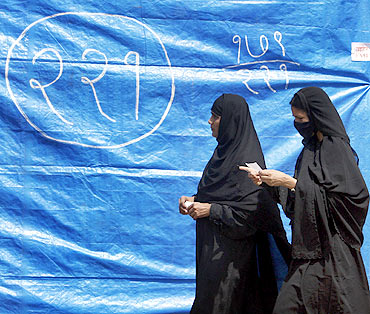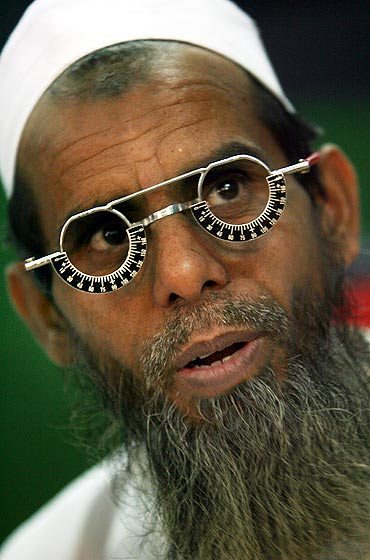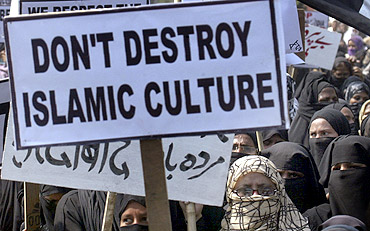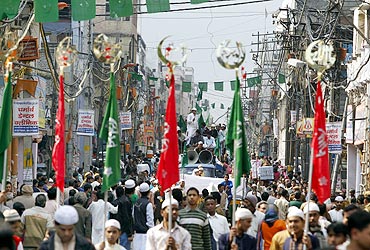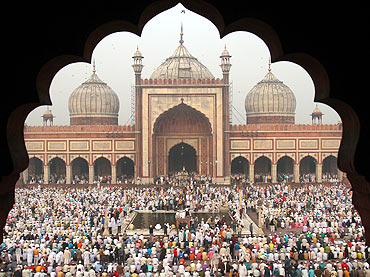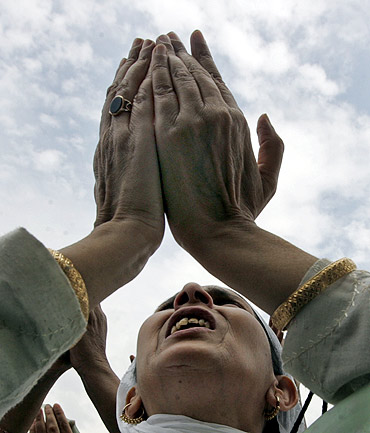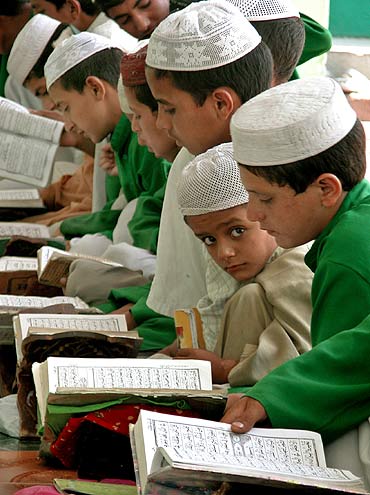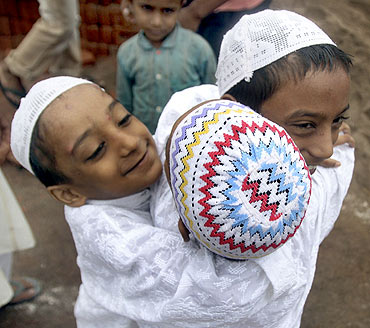 | « Back to article | Print this article |
'The govt as well as the Muslim elite must contribute'
Aijaz Ilmi is chairman of the Executive Board of Siyasat Jadid, a popular Urdu newspaper brought out from Kanpur and Lucknow. He is a senior political analyst with the television channel News X, and writes on Muslim, national and international issues in various newspapers. In this interview with Yoginder Sikand, he reflects on the present Indian Muslim leadership.
One often hears the argument that one of the principal causes of the overall marginalisation of the Indian Muslims is that they lack a responsive and representative leadership. How do you view this argument?
I don't see why Muslims should be led by Muslims alone, or why any other community should be led only by members of that particular community. Why must we expect only Muslim leaders to speak for and about Muslims? Muslims are also Indian citizens, and so why should their issues not be taken up by non-Muslim political leaders as well?
Very often, one hears the complaint that Muslim backwardness is a result of government neglect. The Muslim media continuously reinforces this view. I do not deny that successive governments have been neglectful of Muslims, but my point is that blaming the government alone is a convenient way to absolve the Muslim haves of their complicity in reinforcing Muslim backwardness.
Our marginalisation is definitely a result of government neglect and bureaucratic apathy, but it is also because self-styled Muslim leaders and well-to-do Muslims have done precious little for the community's economic and educational advancement, continuously harping on emotional, identity-related and what are narrowly conceived as 'religious' issues.
What Muslims today require is, definitely, a sympathetic government and a sensitive bureaucracy, but they also need effective community leaders and social activists, and not just politicians, to make sure that government schemes -- and there are so many of them, some of them specifically for minorities -- reach the grassroots and their intended beneficiaries.
Please click NEXT to read further..
'The Muslim elite are either selfish or afraid to help'
What you call the 'Muslim haves' seem, with some exceptions, quite indifferent, to wider community concerns -- educational and economic backwardness. This is particularly so in northern India, where most Muslims live. Why is this so?
Perhaps it is because they are so engrossed with their own lives, careers and consumerist pursuits that they are not bothered at all about the problems of the Muslim poor. In a sense then, it is a reflection of a deep-rooted selfishness. They have reached their destination or are about to, but they don't want to help others reach the same place.
The indifference of the Muslim haves could also be a result of a fear, exacerbated in these times of increased profiling of Muslims, of being wrongly branded as 'communal', 'obscurantist' or worse if they dare to speak out about genuine Muslim concerns or take more than just a superficial interest in Muslim problems.
How do you see the willingness or otherwise of Muslim representatives in Parliament to take up substantive issues of concern to Muslims? How do you see their performance?
I think that, by and large, elected Muslim representatives in Parliament focus on issues other than those specific to Muslims, such as larger national and international questions. Because they are members of one party or the other, they regard themselves as answerable primarily to their parties rather than to their Muslim voters, so that itself limits what they can or are willing to do as far as substantive Muslim issues are concerned. They have no choice but to work within the system.
Many of the concerns of Muslims in areas are local in nature, issues that can be solved at the village, panchayat or municipality level -- issues such as schools, roads, electricity, ration cards, sanitation and such like. MPs would not normally take up such issues.
We need to shift our focus from an obsession with party politics to focussing on the social, economic and educational advancement of the Muslim have-nots.
'Muslims are mobilised for the wrong causes'
But are what you call the 'Muslim haves' willing to do this?
Honestly, I have my doubts. You can see how such basic, substantive issues are rarely, if ever, raised by the Muslim haves, both in the work of the various organisations that claim to represent the Muslims as well as in the demands that they make on the state. Instead, they are preoccupied by identity-related, symbolic and what they project as religious issues.
And because there is little or no pressure from the grassroots to alter this and to focus, instead, on substantive issues, they continue to do so because it is in that way that their authority within the Muslim community can be sustained. It is not that the grassroots are silent and passive, unwilling to agitate. Far from it. See what a massive agitation the Muslim political elite and the ulema were able to whip up in the name of Islam being in danger on the Shah Bano affair, when they created such a terrible stir just to deny a hapless old woman, divorced after more than 40 years of marriage at the age of 74 an alimony of just Rs 500!
No, the Muslim grassroots can be mobilised, but this has happened only for regressive purposes, not for substantive issues such as education, employment and so on. There is reason in this madness -- the Muslim haves, by and large, want the Muslim have-nots to remain where they are so that they can control them and speak in their name by claiming to be their leaders. I want to make another point about the Shah Bano controversy here.
This situation cannot change unless the Muslim haves change their stance and begin to work with and for the educational and economic empowerment of the Muslim have-nots while desisting from exploiting them in the name of religion and community.
Even a bit of sacrifice on their part can work amazing wonders for the have-nots. Of the roughly 170 million Indian Muslims, some 3 per cent, or around 50 lakh people, are tax-payers. If each of them contributes just Rs 100 rupees a year, it would create a corpus of Rs 50 crore, which would be enough to ensure that not a single Muslim child drops out of school.
'A separate Muslim party will not work'
It is often argued that Muslims need a separate political party to highlight their concerns and champion their interests because non-Muslim-dominated parties are largely indifferent to them. Do you agree with this suggestion?
This talk of a separate Muslim political party comes up whenever there is an election round the corner. I am convinced that such a party that aspires to promote only what are thought of as specifically Muslim interests will be a non-starter.
After all, politics in this country is a game of numbers, entailing accretion of diverse groups with similar interests and aspirations. So, parties have to appeal beyond a single community and need to speak of the larger good, of larger aspirations and social issues than those specific to a particular community. A party that talks only of Muslim issues cannot work politically.
Issues specific to the Muslims must be addressed through non-party forums by Muslim social activists, lobbying groups, social activists and NGOs and so on.
How and why is it that the Muslim middle-class, whose understanding about community issues and priorities might be distinct from that of the Muslim political elites, are not visible in trying to articulate an alternative leadership?
The Muslim middle-class, even in north India, is rapidly expanding, but it is still not very articulate. It lives in a twilight zone, with all the dilemmas and insecurities that this entails. It is stuck between their age-old respect for the ulema and a new-found loathing for them, a very paradoxical and perplexing situation.
It does not want to take on the ulema, but, at the same time, it does not consider them as leaders and it detests their politicking. Middle-class, modern-educated Muslims want the maulvis to remain confined to their role as ritual or religious specialists. This is related to what I just termed as their 'new-found loathing' for the ulema, because they are tired of, indeed utterly disgusted with, their redundant and absurd fatwas and narrow sectarianism, which the media, always on the look-out for sensational news, never spares any opportunity to highlight.
They are tired of Muslims being projected by the media as predatory, dirty, violent, barbaric parasites, an image that the ulema class, by their actions and statements, are doing everything to reinforce.
The influence of the maulvis is greatly exaggerated'
The media claims that the maulvis exercise an enormous influence on Muslims, and the maulvis do everything to sustain that image. But is the claim true?
I think this has been grossly exaggerated, both by the media and the maulvis. It is a fallacy to claim that the Muslims are in the grips of the maulvis, although it is true that the maulvis would like this to be the case.
The monopoly of the maulvis in politics is truly over, and even in terms of their control over religious interpretation, their monopoly is being challenged by 'lay' Muslims interpreting Islam for themselves, for instance through the Internet.
If you do a survey of the last three general elections, you will find that Muslims have not voted as some ulema might have directed them to, except perhaps in some isolated rural pockets. Rather, they have voted in accordance with the general regional or national trend. This clearly exposes the media propaganda that the mualvis control Muslim voting patterns. It shatters the myth of a Muslim vote-bank. Muslims are now becoming increasingly politically savvy, because they know that their votes are important and that they can easily determine the political fortunes of various parties, particularly in places with a large Muslim population.
Even the maulvis, or some of them, are changing. Increasingly, some of them are, in response to public demand and pressure, incorporating English, Hindi, science and so on in the curriculum of their madrasas, though not on the scale or level that many others would desire.
'Muslim society is totally lacking in gender sensitivity'
The media routinely highlights absurd anti-women fatwas issued by various madrasas and muftis, and in this way reinforces negative images of Islam and Muslims. What do you feel about the role of the maulvis in all of this?
I think the Muslim clergy, as well as the Muslim society generally, are totally lacking in gender sensitivity. They have paralysed half of the community -- its women. So, you cannot blame the media alone. If dozens of Muslim-majority countries have reformed Muslim personal laws to provide more rights to Muslim women, why do the Indian maulvis, including the All-India Muslim Personal Law Board, continue to oppose any such reform? It is easy to see why they refuse to reform these laws. It is simply because if they permit this to happen, their own hegemony will be undermined.
They fear the emergence of Muslim feminist voices that would make them socially and politically irrelevant and would also threaten male Muslim privileges, which they seek to defend in the name of Islam. I think there is a lot of hypocrisy involved in all of this.
Half the top ulema send their daughters to modern schools and colleges, while, at the same time, they insist that the women of the community must remain behind veils and within the four walls of their homes.
To come back to the question of the Muslim middle-class, you said it is emerging and rapidly expanding, even in northern India, where the bulk of the Muslims are concentrated, and where most of them are poor. How is this reflected in terms of educational levels?
There has been a sea-change in attitudes towards modern-education, and today even humble Muslim carpenters and weavers want their children to gain knowledge of English and of modern subjects so that they can avail of opportunities that they themselves could not.
In this context of rising aspirations, the Muslim haves must take the lead in setting up good quality educational institutions that provide such education at affordable prices for the Muslim have-nots. The state, too, must play its role in this regard, for it ought to know that the story of 'shining India' would be woefully incomplete if the 170 million strong Muslim community continues to wallow in poverty.
'The govt should desist from interfering in the madrasa system'
How do you see the argument that madrasas, where the maulvis are produced, are in need of considerable reform, which would also include reforming this sectarian mindset which is based on what you call a very ritualistic understanding of Islam?
I think the government should desist from interfering in the madrasa system. If it is seriously interested in promoting modern education among Muslims -- which it should be if it really cares for the future of this country -- it must focus on setting up quality modern schools in Muslim localities.
If that happens, Muslims who today send their children to madrasas as a last resort, out of economic compulsion, would enthusiastically welcome modern education and prefer to send their children there than to madrasas. But the fact is that the government has not done this all these years. In fact, in this regard, it has miserably failed.
Of course, madrasas need to reform in order to equip their students to navigate in the modern world, but I strongly feel that they should be left free to do this on their own. And this is happening. Even small madrasas have started teaching English, Hindi, maths and so on.
You spoke about the increasing demonisation of Muslims and what that has meant for the sense of insecurity that characterises Muslims in the country. What role has the media played in this? Some Muslims argue that the media is itself 'anti-Muslim' and is engaged in what they allege is an 'anti-Islamic conspiracy'.
It is true that sections of the media are definitely anti-Muslim. There are other sections that also paint Muslims in a negative light, though not a result of any such conspiracy but, rather, because they thrive on sensationalism and negative news, which make good copy. Then, another factor to consider is the bombardment by the Western media of negative images of Islam and Muslims, wrongly tarring all Muslims with the same brush. This is playing a terrible role in fanning anti-Muslim prejudices.
But that said, one also has to speak about the Muslim, particular Urdu media, that is no less sensationalist than sections of the 'mainstream' media when it comes to covering Muslim issues, although, of course, in the opposite direction.
'Young Muslims have the same dreams as Young India'
What sort of leadership -- political and religious -- do you think young generation Muslims are looking for, and how do they see the present Muslim leadership?
The younger generation of Muslims is similar to the rest of young India. They too have dreams and aspirations of a successful meaningful engagement with the India story. They might be eager and lack patience but that can't be held against them.
Tired of corruption and hollow rhetoric, they are yet to participate in large numbers. Political dynasty, nepotism and rowdy-ism, along with the repressive mindset of our leading clergy, are pitfalls young educated Muslims are aware of. For obvious reasons, no community leader has a pan-India appeal.
What they want is good governance and just, equitable growth which takes into account their special situation they face daily. The Indian Muslim young can only hope like the rest of India. They must prepare suitable leadership to articulate their concerns and aspirations as they will need to rapidly clear the mess the nation finds itself in today.
